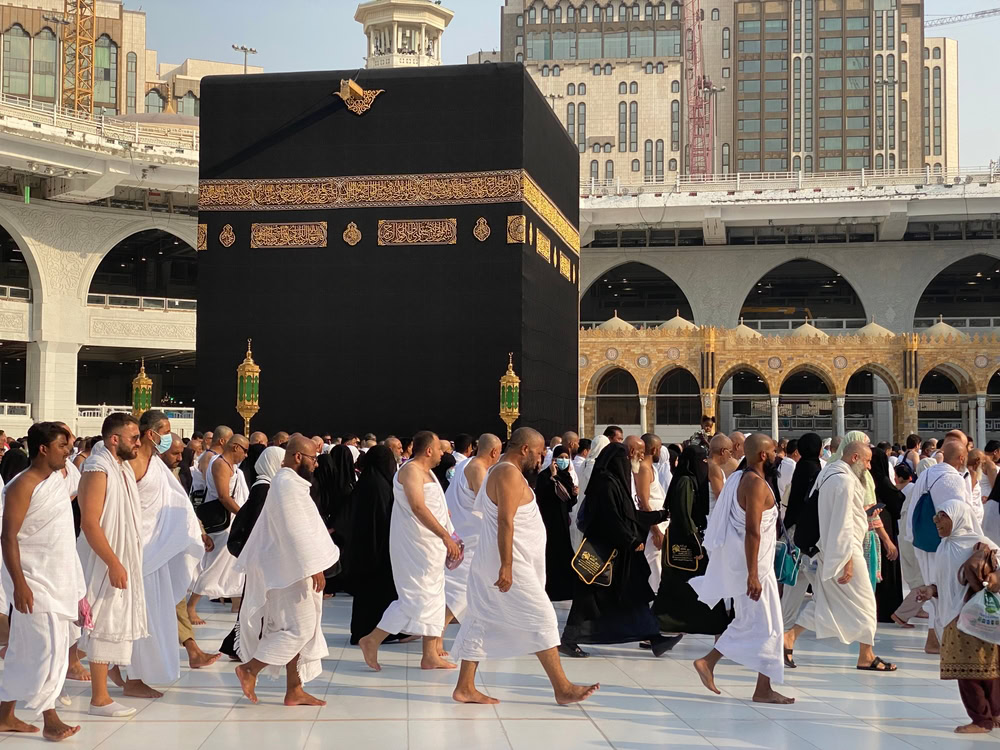What Are The Rulings On Performing Hajj and ‘Umra on Behalf of Another?
Answered by Shaykh Irshaad Sedick
Question
- Is it permissible to perform ‘Umra via delegation on behalf of multiple individuals (deceased or seriously ill) in a single trip?
- I plan to undertake ‘Umra via delegation for approximately ten deceased Muslims. The travel expenses will be collectively covered by the families of these individuals, with each family contributing an equal share (1/10) of the total costs, ensuring no profit is made by the individual performing the ‘Umra. Is this arrangement permissible?
- Is it permissible for ‘Umra agencies to organize ‘Umra via delegation programs, where one person, who has already completed his own ‘Umra, performs ‘Umra via delegation for five or ten individuals? This would be arranged on a non-profit basis to ease the financial burden on the families of the deceased.
Answer.
In the Name of Allah, the Most Merciful and Compassionate. May Allah alleviate our difficulties and guide us to what pleases Him. Amin.
It is permissible to perform ‘Umra on behalf of several individuals provided the conditions are fulfilled, as detailed below. Upon fulfillment of the conditions listed below, one may hire another to fulfill the rituals of Hajj or ‘Umra for an agreed-upon fee. Adopting permissible strategies to lighten everyone’s fiscal burden is permissible, and Allah knows best. [Keller, Reliance of the Traveller]
Please see this related answer. Dar al-Ifta, Jordan provided the details below.
Hajj and ‘Umra On Behalf of Another
If a person cannot perform Hajj or Umra due to an illness that is not expected to be cured or due to old age, they may appoint someone to perform these acts on their behalf. This practice is called “Al-Inaba” (delegation).
The Shafi‘i scholar Shirwani said: “It is permissible for the one who is unable perform the mandatory Hajj and Umra due to illness or old age to appoint a proxy to perform these acts on their behalf, and this is even obligatory. In the case of mandatory Hajj, delegation on behalf of a dead person is permissible.
In the case of voluntary Hajj, delegation is allowed if the person making the delegation specifies it in their will. However, a person who is physically and financially able to perform Hajj or Umra is not allowed to delegate the performance of these acts to another. [Hashiyat al-Sharwani ‘ala Tuhfat al-Muhtaj, Vol.7, Page 94]
Who Is Considered Unable?
The Excused person is someone physically unable to perform Hajj themselves due to a condition for which there is no expectation of recovery, such as old age, chronic illness, or disability, or because they are elderly and unable to withstand the journey’s hardships without excessive difficulty. [Nawawi, Al-Majmu‘ Sharh al-Muhadhdhab, Vol.7, Page 94]
Since such individuals aren’t able to perform Hajj or ‘Umra themselves, they are allowed to delegate someone to perform these acts on their behalf if the conditions for delegation are met. Moreover, it is conditioned to obtain the consent of these individuals in the case of Hajj and ‘Umra because they are alive and have free will and choice.
Imam Nawawi (Allah have mercy on him) said, “Performing Hajj on behalf of the person who is physically unable to perform it doesn’t avail without their consent. This is because Hajj requires intention, and they can permit delegating someone to perform Hajj on their behalf.”
Guidance
Maintaining a sincere intention (niyya) throughout the process is essential, seeking only Allah’s pleasure and the umma’s well-being. Remember, the efficacy of these rituals lies in their sincerity and the fulfillment of Islamic tenets. May Allah (Most High) accept your ‘Umra, multiply your rewards, and make your path easy. Always strive to act with compassion and seek guidance through prayer and consultation with knowledgeable scholars to ensure that your deeds align with the teachings of Islam.
I pray this is of benefit and that Allah guides us all.
[Shaykh] Irshaad Sedick
Checked and Approved by Shaykh Faraz Rabbani
Shaykh Irshaad Sedick was raised in South Africa in a traditional Muslim family. He graduated from Dar al-Ulum al-Arabiyyah al-Islamiyyah in Strand, Western Cape, under the guidance of the late world-renowned scholar Shaykh Taha Karaan.
Shaykh Irshaad received Ijaza from many luminaries of the Islamic world, including Shaykh Taha Karaan, Mawlana Yusuf Karaan, and Mawlana Abdul Hafeez Makki, among others.
He is the author of the text “The Musnad of Ahmad ibn Hanbal: A Hujjah or not?” He has served as the Director of the Discover Islam Centre and Al Jeem Foundation. For the last five years till present, he has served as the Khatib of Masjid Ar-Rashideen, Mowbray, Cape Town.
Shaykh Irshaad has thirteen years of teaching experience at some of the leading Islamic institutes in Cape Town). He is currently building an Islamic online learning and media platform called ‘Isnad Academy’ and has completed his Master’s degree in the study of Islam at the University of Johannesburg. He has a keen interest in healthy living and fitness.
